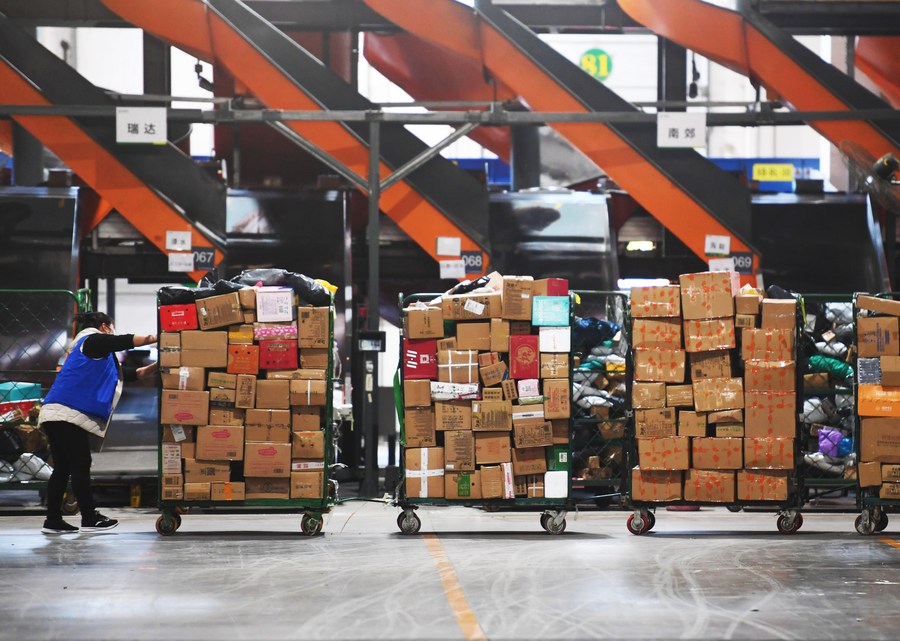China's mid-year online shopping bonanza paves way for consumption recovery
 0 Comment(s)
0 Comment(s) Print
Print E-mail Xinhua, June 06, 2022
E-mail Xinhua, June 06, 2022

Staff members transport packages at a logistics center in Zhengzhou, central China's Henan Province, Nov. 11, 2021. (Xinhua/Zhang Haoran)
BEIJING, June 5 (Xinhua) -- China's weeks-long mid-year online shopping event got off to a steady start amid business resumption and pro-growth policy incentives, which analysts believe can help boost consumption as COVID-19 impacts wear thin.
The annual shopping bonanza, featuring promotional campaigns at multiple e-commerce platforms, kicked off on June 1. Many online retailers said sales took off in the beginning hours, especially on upscale big-ticket items.
The first 4 hours of JD.com's campaign saw sales of gaming television top that of last June as a whole, while sales of smartphones costing over 4,000 yuan (about 596 U.S. dollars) from six brands tripled year on year.
Suning reported a 78-percent year-on-year sales increase on high-end home appliances of over 10,000 yuan during its first round of the campaign, while the number of customers trading in old items for new ones rose 56 percent from a year ago.
The whopping growth is backed by the recovery of the retail sector, as the country accelerates the implementation of policies to stabilize the economy. Industry activity gauges for warehouse storage, logistics and e-commerce logistics have all perked up in May from a month ago while posting upbeat expectations for further expansion.
Shanghai, for instance, handled an above-average daily total of 11 million express delivery packages on June 1, the first day of its return to normal production and life after two months of closed-off management to contain the COVID-19 resurgence.
Tempting prices and generous giveaways at e-commerce platforms also fueled shoppers' passion. JD.com and Pinduoduo have collaborated with cities like Beijing, Shenzhen and Shanghai to issue vouchers for customers to use on top of already reduced prices.
With the help of these incentives, the year's major online shopping event will serve as a strong driver of consumption, which was dampened by COVID-19 flare-ups, said Li Mingtao, an analyst with China International Electronic Commerce Center.
Online outlets are taking up increasingly larger shares of China's consumer product market. In the first four months of this year, online sales of physical goods rose 5.2 percent, with its proportion in retail sales climbing to 23.8 percent.
These outlets are pooling their resources along the supply chain, including nationwide warehouse networks and internet traffic, to expand sales for struggling small and medium-sized firms.
Noting that small businesses, like many vendors on e-commerce platforms, are the main targets of supportive policies, Zhao Ping, vice president of the Academy of China Council for the Promotion of International Trade, said these platforms can help free them from constraints in the financing, technology, marketing and human resources by offering digital solutions.
China will step up the integrated development of online and offline shopping, and nurture new consumption trends like customization and experiential shopping, said Vice Minister of Commerce Sheng Qiuping.
The country has rolled out a series of detailed measures to further tap its consumption potential and tackle short-term bottlenecks, including relaxing restrictions on car purchases and handing out billions of yuan in shopping vouchers.


